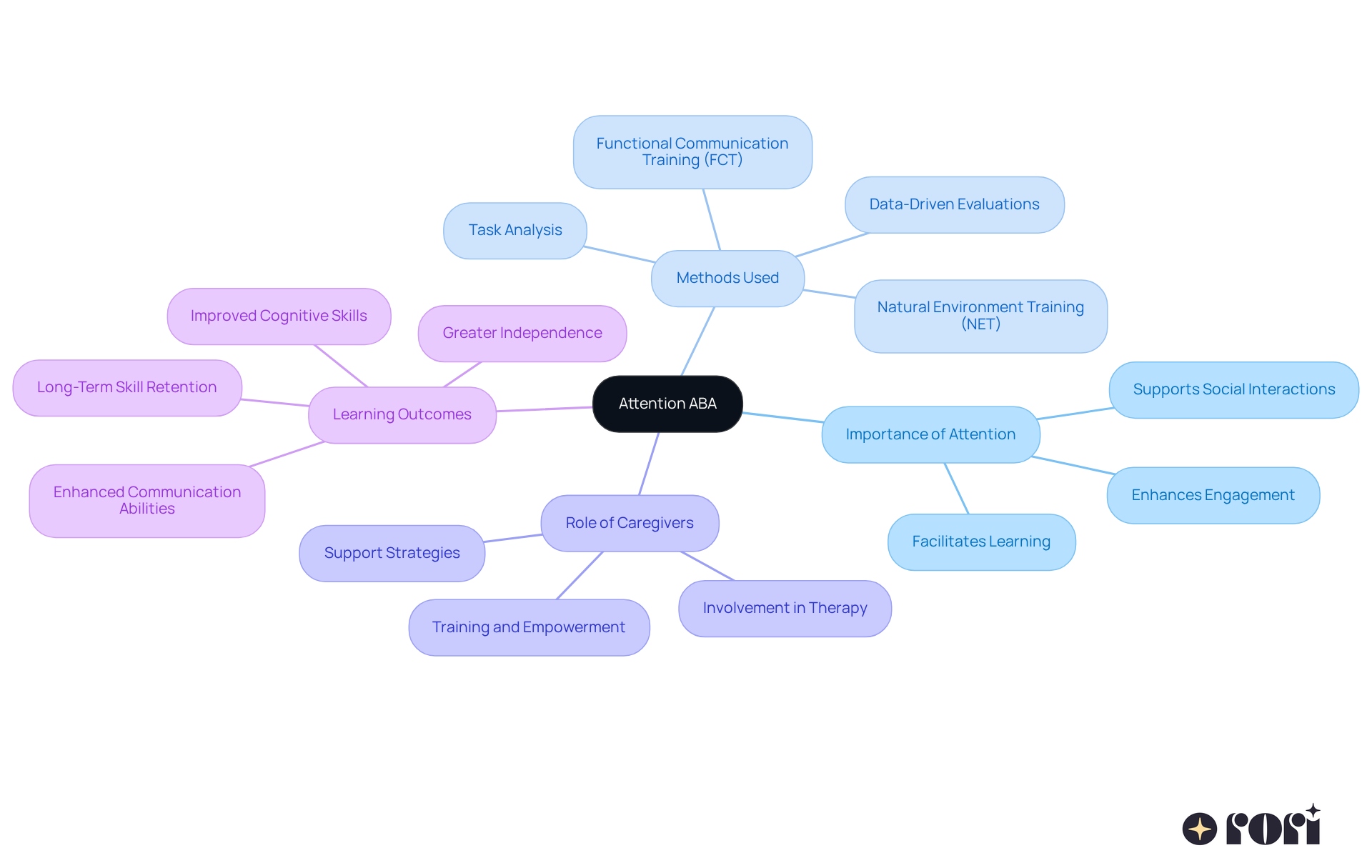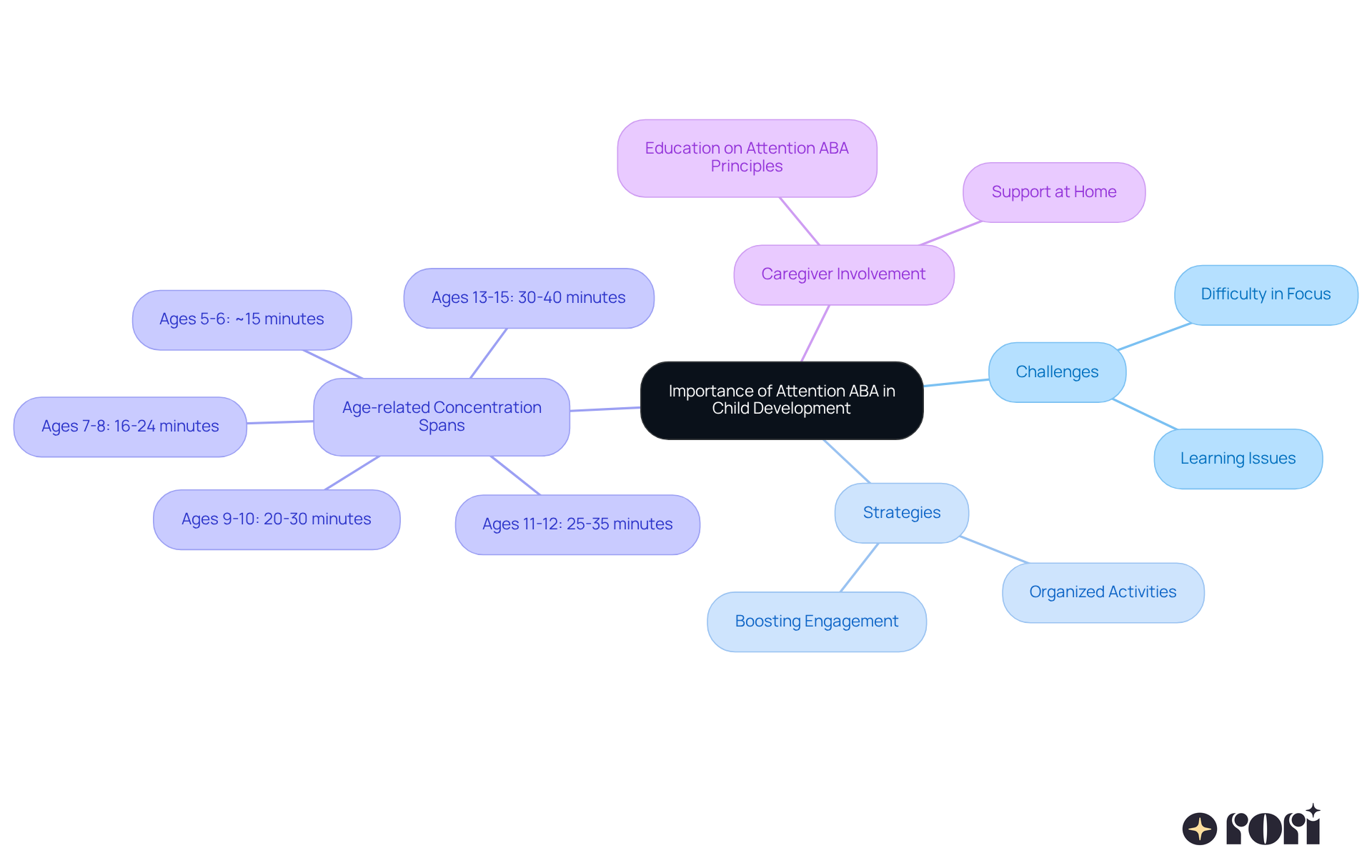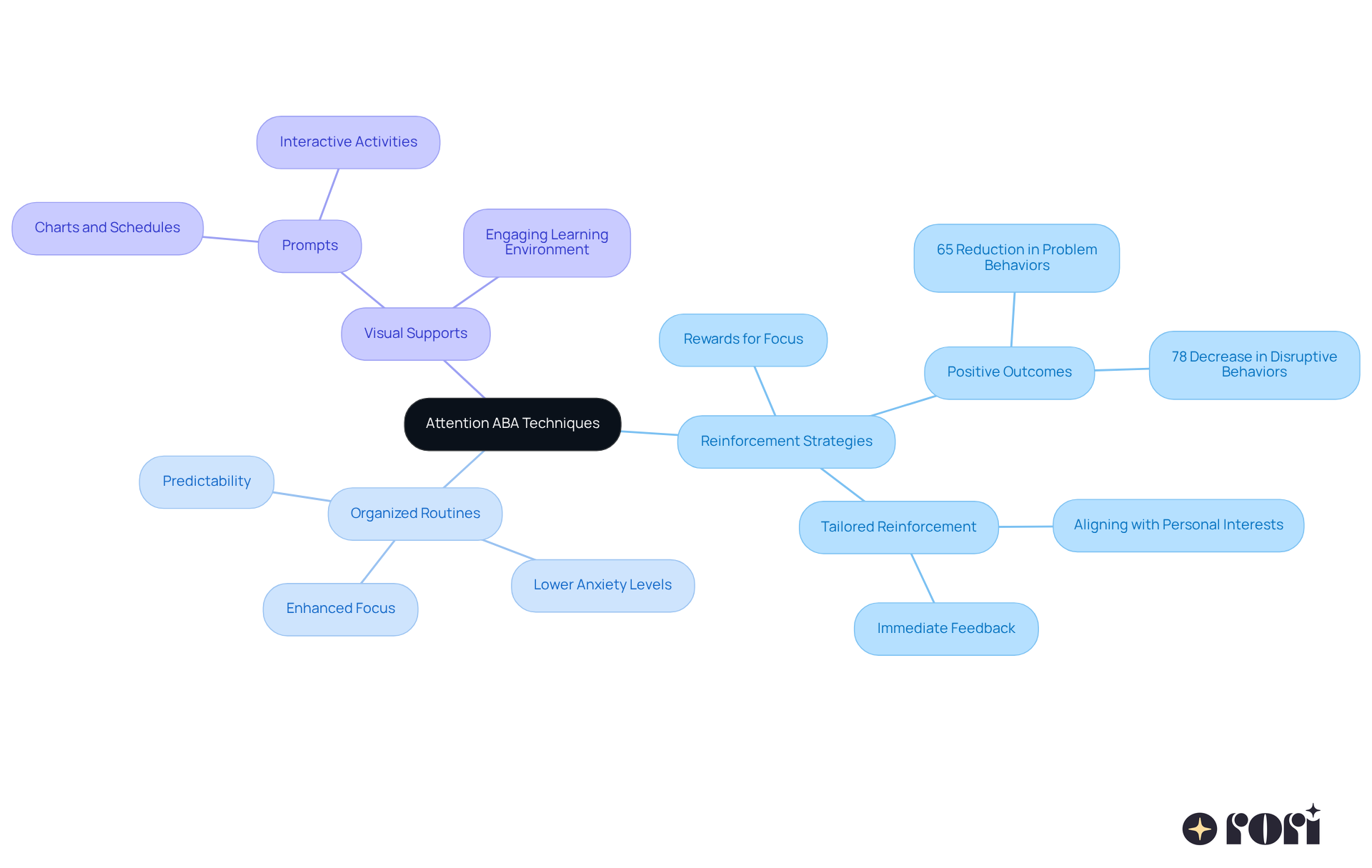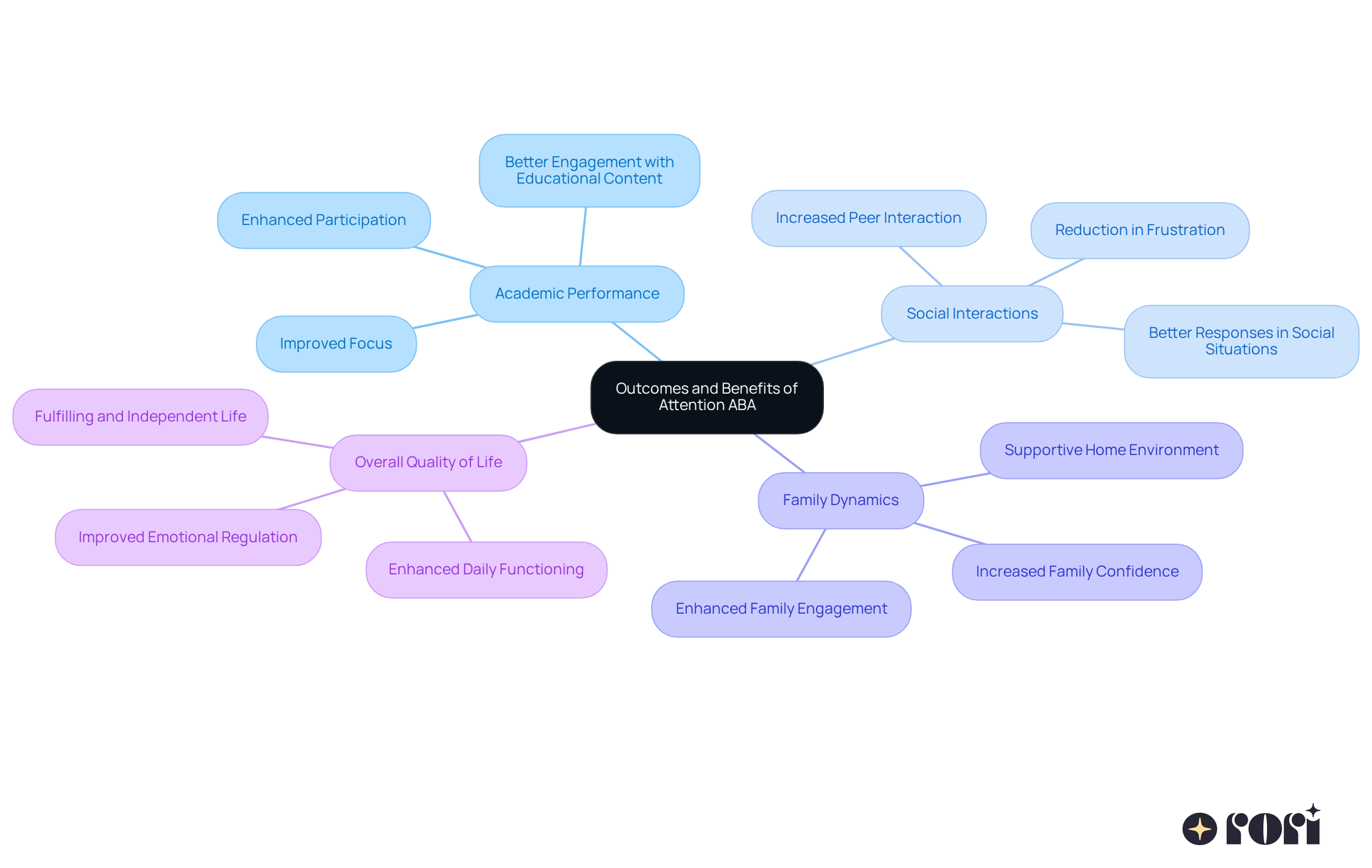Attention ABA is a game-changer in child development, especially for our little ones with autism. It helps enhance focus and engagement, leading to better learning outcomes and social interactions. Isn’t that amazing?
Structured techniques like reinforcement strategies, organized routines, and visual supports can really make a difference. These tools boost attention abilities, paving the way for improved academic performance and social skills. Ultimately, this contributes to a higher quality of life for these children.
Let’s explore this together! It’s all about finding the right support and resources that can help your child thrive. We’re here to help you every step of the way!
Attention is a cornerstone of effective learning and social interaction. Yet, many children, especially those with autism, face challenges in maintaining focus across different settings. Understanding Attention ABA—Applied Behavior Analysis focused on enhancing attention skills—opens up a pathway to improve concentration and foster independence and social engagement.
So, what can caregivers and educators do to turn these attention challenges into opportunities for growth and success? 🤔 This article dives into the vital role of Attention ABA in child development. We’ll explore innovative techniques and the profound impact they can have on young lives. Let’s explore this together!
ABA, or Applied Behavior Analysis, is a specialized method that focuses on helping young people enhance their attention skills. This approach is particularly crucial for individuals with autism, as attention challenges can make it tough for them to engage with their surroundings and learn effectively. At Rori Care, our clinical leadership team is passionate about valuing neurodiversity and empowering caregivers with ABA principles and strategies.
Attention ABA utilizes systematic techniques to enhance an individual's focus and responsiveness to different stimuli. This, in turn, helps improve learning outcomes and social interactions. By relying on data-driven evaluations, clinicians can tailor interventions that specifically tackle attention-related challenges. This ensures that each person's unique needs are addressed.
We believe that training caregivers is essential. It not only enhances support and informed decision-making but also leads to better behavioral outcomes. Plus, it empowers families as they navigate the journey of supporting youth development. Let’s explore this together! We’re here to help you every step of the way!

Focus abilities are so important for a young person's growth, especially in school and social settings. Many children with autism find it tough to stay focused, which can make it harder for them to learn new skills and connect with their peers. That's where attention aba plays a crucial role! It tackles these challenges head-on by using strategies designed to boost attention aba, focus, and engagement.
For example, organized activities that encourage concentrated behavior can lead to amazing improvements in how kids participate in educational settings. Did you know that children aged 5-6 typically have a concentration span of just over 15 minutes? And for those aged 7-8, it’s a bit longer, around 16-24 minutes! By promoting focus, kids are better equipped to pick up on social cues, follow directions, and develop essential life skills, which ultimately leads to increased independence and a better quality of life.
Plus, when we empower caregivers with education on attention aba principles and strategies, they can provide even more support at home, complementing professional help. This not only eases caregiver stress but also boosts their confidence, leading to informed decisions that improve behavioral outcomes. When caregivers actively participate, it aligns beautifully with therapeutic strategies, resulting in more effective and lasting improvements in attention aba and focus.
Let’s explore this together! We’re here to help you every step of the way!

Key techniques in attention ABA include reinforcement strategies, structured routines, and visual supports, all designed to enhance focus and engagement in individuals with autism and other behavioral challenges. Think about it—reinforcement strategies are crucial! They involve rewarding preferred behaviors, like maintaining focus during tasks, which significantly increases the chances of those behaviors being repeated. Research shows that positive reinforcement can lead to transformative outcomes, with studies indicating that structured reinforcement strategies can reduce problem behaviors by up to 65% in family settings.
Organized routines play a vital role, offering predictability that helps kids understand what to expect and lessens anxiety that can lead to focus challenges. A thorough study revealed that children who participated in organized routines exhibited enhanced focus and lower anxiety levels, leading to better overall involvement in activities. It’s amazing how a little structure can go a long way!
Visual aids, such as charts and schedules, serve as helpful prompts that keep kids focused on their tasks. These tools not only clarify expectations but also make the learning environment more engaging. Imagine how incorporating interactive and fun activities can further spark a young person's interest, making it easier for them to stay on track.
When these strategies are tailored to meet the unique needs of each child, the results can be remarkable! For instance, a case study showed that kids who engaged in structured routines and received prompt reinforcement for staying on task experienced a 78% decrease in disruptive behaviors. This really highlights how effective these methods can be in real-life situations. Overall, integrating organized routines and reinforcement techniques in attention ABA is essential for promoting focus and involvement in children with autism, ADHD, and other learning disabilities. Let’s explore this together!

Implementing attention ABA can lead to wonderful outcomes for youth with autism, thanks to Rori Care's dedicated clinical leadership team. They truly believe in neurodiversity and are passionate about helping young individuals succeed. When kids enhance their focus abilities, they often see improvements in their academic performance, making it easier for them to engage with educational content and participate in classroom activities.
But that’s not all! Increased attention can also foster better social interactions. As young individuals learn to concentrate on their peers, they become more adept at responding appropriately in social situations. Families notice a reduction in frustration and gain confidence in their children's abilities, all thanks to the principles and strategies provided by Rori Care.
For example, many youngsters who have experienced ABA interventions show remarkable progress in following directions and joining group activities. This leads to a more fulfilling and independent life. Overall, the integration of attention ABA into autism care, supported by Rori Care's expertise and compassion, marks a significant step forward in supporting children's developmental needs. Let’s explore this together!

Understanding the significance of Attention ABA reveals its crucial role in enhancing child development, especially for those with autism. This specialized approach not only focuses on improving attention skills but also empowers caregivers with essential strategies to support their children's growth. By creating an environment where young individuals can thrive, Attention ABA opens doors to better learning outcomes and social interactions.
The article highlights the importance of tailored interventions that meet the unique needs of each child. Techniques like reinforcement strategies, structured routines, and visual supports are effective tools in promoting focus and engagement. These methods help reduce anxiety and enhance participation in educational settings, leading to improved academic performance and social skills. Plus, integrating caregiver education amplifies these benefits, building a supportive network for children to flourish.
Ultimately, implementing Attention ABA serves as a transformative approach in the lives of children with autism and other developmental challenges. By prioritizing attention skills, families can witness remarkable changes in their children's abilities, fostering independence and confidence. Engaging with Attention ABA is not just a strategy; it’s a commitment to nurturing the potential of every child, ensuring they have the tools necessary for a fulfilling future. Embracing this approach can lead to significant positive outcomes, making it imperative for caregivers and educators to explore and implement these vital techniques. Let’s explore this together!
What is Attention ABA?
Attention ABA, or Applied Behavior Analysis, is a specialized method aimed at helping young people enhance their attention skills, particularly beneficial for individuals with autism.
Why is Attention ABA important for individuals with autism?
Attention ABA is crucial for individuals with autism because attention challenges can hinder their ability to engage with their surroundings and learn effectively.
How does Attention ABA improve learning outcomes?
Attention ABA utilizes systematic techniques to enhance an individual's focus and responsiveness to different stimuli, which in turn improves learning outcomes and social interactions.
How are interventions tailored in Attention ABA?
Interventions in Attention ABA are tailored through data-driven evaluations, allowing clinicians to address each person's unique attention-related challenges.
Why is caregiver training emphasized in Attention ABA?
Caregiver training is emphasized because it enhances support, informed decision-making, and leads to better behavioral outcomes, empowering families in their journey of supporting youth development.
What is the role of Rori Care in Attention ABA?
Rori Care's clinical leadership team is dedicated to valuing neurodiversity and empowering caregivers with ABA principles and strategies to support youth development effectively.